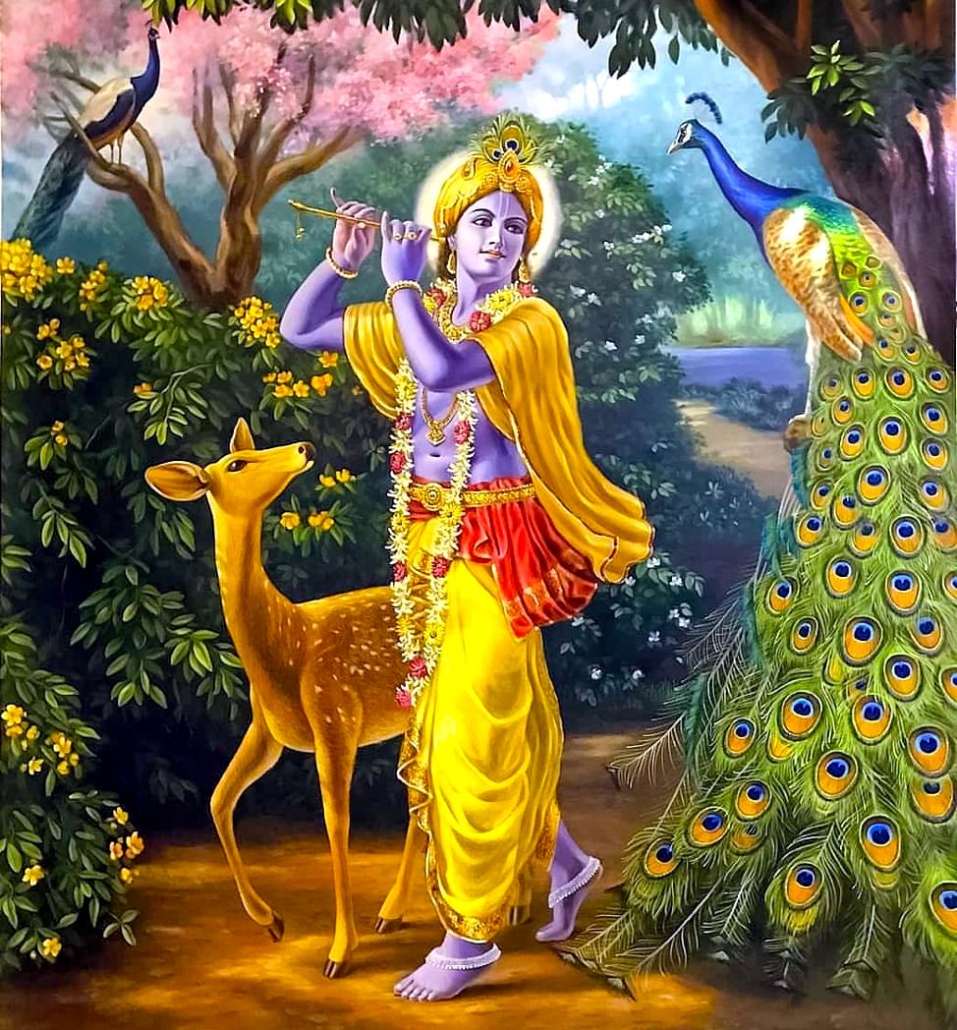Mahanidhi Madan Gopal Das
Herein we present a sweet selection of rasika-acharya, Sri Jiva Goswamipada’s Krishna prema-filled comments on the Venu-gita (Srimad Bhagavatam 10.21). By reading and studying these comments along with the verses of Venu-gita, you will attain a happy feeling in your heart, and renewed enthusiasm to love and serve Radha and Krishna more and more.
10.21.3 When the Vraja-gopis hear Shyama’s flute song, which incites Cupid’s influence, some gopis privately describe Krishna’s qualities to their intimate friends.
Sri Jiva Goswami’s tika: Seeing the autumnal beauty, Sri Krishna gets excited and practices flute playing to attract the gopis. Thus they become aroused (verse word smaraudaya), and start glorifying Krishna in this chapter. Although now Krishna is in pauganda period (5-10 years), His flute playing arouses amorous desires in the gopis because it magically manifests the kaisora age (10-15).
Not only ladies but all living entities in Vraja become immensely attracted (verse word sarva-bhuta-manoharam) to Krishna’s venu-nad. For Yashoda, it arouses vatsalya, motherly affection, and not smara or amorous intimacies. But for Radha it is smara, and thus Sriji herein reveals Her mental anguish to Her confidantes like Lalita-sakhi.
10.21.4 While speaking about Krishna, the damsels of Vrajabhumi remember His lilas. The power of Cupid, however, arises to agitate their minds and then they stop speaking.
Sri Jiva Goswami’s tika: This verse describes the sequence of rising love. Although they try, because of love’s impulses (verse word smaravegena), the gopis become mum. They simply think about that “heart stealer”, Muralimanohara, again and again.
10.21.5 Featuring a peacock-feather ornament upon his head, yellow karnikara flowers on his ears, a brilliant golden yellow garment, and a Vaijayanti garland, Sri Krishna looks like the best of dancers as He prances into Vrndaranya, beautifying it with the unique marks of his footprints. As Krishna fills the flute with the nectar of his lips, the gopas sing his glories.
Sri Jiva Goswami’s tika: Among all the sakhas, Govinda is most attractive, and even more so because now Krishna is dressed as a dancer (verse word natavesa). Filling the flute with the nectar of his lips means Krishna’s flute song is as attractive as Krishna’s adharamrta. The verse word vrndaranya means that sakhi Vrnda-devi has already cleaned and specially decorated the forest to stimulate Krishna’s lilas. The presence of Krishna’s extraordinary 19 footprints in the forest of Vrndavana gives bliss (verse word ramanam), to everyone especially Vrnda-devi. And the charming, soft dust, fragrant flowers, leaves etc. give delight (ramanam) to Radha-ramana’s lotus feet.
The verse describes Krishna’s natural adornments of feathers, leaves and Vraja flowers, and not His usual gold and pearl necklaces etc. Why? Because upon entering Vrndaranya, Krishna sets these aside in preference to decking Himself out with Vraja’s natural opulences of leaves, flowers, feathers, mineral pigments and gunja berries. Krishna is also sporting only forest decorations as appropriate for the first day of His Autumnal pastimes.
10.21.6 When the young Vraja-gopis hear Krishna’s venu, which steals the minds of all living beings, they embrace each other and describe it.
Sri Jiva Goswami’s tika: All the gopis (verse word vraja-striyasarva) indicates all degrees of attachment to Krishna i.e. deep, medium and light. Some gopis mentally embrace (verse word abhirebhire) Krishna who is seizing their hearts. Or due to arising love, other gopis mistake their sakhis to be Krishna and embrace them. And some sakhis embrace each other because their natural love is awakened.
Venu-gita ki jai! Sri Jiva Goswamipada ki jai!
Radha-Govinda Yugala ki jai! Jai Jai Sri Radhe!

